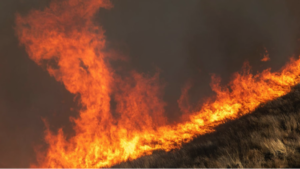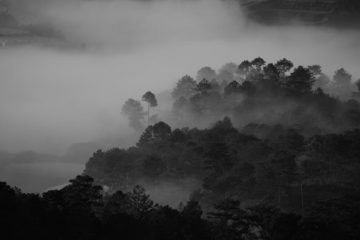It’s Eco-Reformation Day

Today is Halloween, a fun day for most of the U.S. Here in California, however, it’s the heart of Fire Season, a truly scary time. Fires can rage at any season in California today, we’re told, but Fire Season is when the Santa Ana/Diablo winds roar from the east and send low-humidity jolts between fingertips, throw sparks into flame across miles and acres per second, arcing from the electric transmission system that connects our long outmoded energy sources to circuits and outlets. Yesterday in Ventura County the so-called Easy Fire ignited around 6am, seven miles from my home. Driven by gale-force winds, the fire spread quickly, its smoke, embers, and flames surging over thousands of acres. Teams of firefighters from around the state, already mustered and ready to go, managed at great risk to contain the fire at around 1600 acres, by no means a foregone outcome—it very nearly exploded into the adjacent Santa Rosa Valley, consuming whole neighborhoods of humans, native chaparral, and riparian areas. This fire is now mostly contained, but more will spark in the weeks ahead, until the miracle of rain arrives.
The world is on fire, it seems, hillsides and trees, buildings and the night itself turning surreal shades of orange and red, flickering. These tongues of flame have little in common with the stylized orange and yellow shapes sewn onto festive red stoles and worn in Lutheran churches in honor of Reformation Day, which is celebrated on the same day. It’s one thing to want to evoke the fire of the Holy Spirit with swirling fabric on red banners; it’s something else entirely to see those flames approaching in real time. So what does the Reformation have to say today? Luther protested the conflation of grace with greed, and today many Lutherans (including that most awesome Swede, Greta Thunberg) are protesting the catastrophic continuing conflation of greed in, with, and under what is most sacred: the life of the world itself. For the Reformation’s 500th anniversary in 2017, I co-edited with James Martin-Schramm a collection of essays by sixteen Lutheran eco-theologians, titled Eco-Reformation, trawling the depths of this tradition to invoke our “Here we stand” moment today. But of course, despite this and many other attempts at jumpstarting Christian climate activism, it’s not obvious that the church is on fire, even as the world clearly is.
The disjunction between the stylized Spirit-flame invoked in prayer and the actual flames visible near my home reflects the larger gap between religious symbolism and bio-social reality powering our various Western alienations. In my essay in Eco-Reformation, titled “Rewilding Christian Spirituality: Outdoor Sacraments and the Life of the World,” I trace that disconnect through a different element: not fire but water. I propose that the bone-deep Christian eco-conversion our world so urgently needs won’t happen without an equally radical immersion into that world, and I call for a return to the practice of baptism into local waters. Experiencing and treating local waters as the baptismal river both requires Christians to become much more serious about the health of their watersheds (if they are to put babies and other newcomers in these waters) and creates an immersion into a much richer interspecies vision of what Christian life and community are, who is part of this body.
What does Christian baptism have to do with the polluted, deoxygenated creek near my house—or Eucharist with the fact that human bodies are food to other creatures, meant for the jaws and stomachs and surging new life of countless other creatures?
Everything.
Over years of contemplative prayer as a Benedictine Camaldolese oblate, I inhabited the incarnation deeply, sensing the physical inter-permeation of flesh and spirit in Jesus and sacraments and all bodies so fully that one day the logic of the incarnation finally broke through that primal dualism and I stepped out into reality. As I write in Eco-Reformation, “Jesus dissolved into the natural world” and “the chancel walls gave way… [and I] realized it’s all chancel, this sacramental world, the real world.” Out here things look different. From here it’s clear how the indoor captivity of Christianity (a phrase I adapt from Luther’s “Babylonian captivity” of the church of his day) contributes to interlocking forms of privilege ultimately fueling the fires out my door, the effacing of so many Thou’s. How can we be reformed? What would a truly wild church look like? What kind of seminary would make possible the immersive place- and soul-based spiritual leadership—the passion for climate justice informing all we do—that are needed for profound Christian conversion to the world?
Ultimately I sense the God/world distinction itself must dissolve, like Jesus, into the cosmos itself—or become muddied, Earthed—if Christians are ever to step out of those walls and privileges into the places they share with humans of all faiths and no faith, with creatures of all kinds, with winds and snakes, bears and microbes. All of it is sacred, its lives, its deaths, its interdependence. Dietrich Bonhoeffer’s rejection of Christian dualism in his Ethics intrigues me as he insists on God and world as one reality. This is the Reformation I long for, inviting alienated Christians into physical connection and kinship with the rest of this holy mortal world. I want to keep seeing where the incarnation leads: what we split into “God” and “world” is actually one holy biological reality, this actual creek our baptismal river. These flames Earth’s spirit—all the holiness we have—shocking us awake and consuming what will not be sustained. These bodies so exquisitely interwoven with the rest of our kin of all kinds and classes, meant to nourish whatever future will come. Here we stand.
#
Lisa E. Dahill is Professor of Religion at California Lutheran University, Thousand Oaks, CA. A California native, she spent many years elsewhere—most recently Ohio—before returning in 2015 to the rain-starved bioregion she grew up in. When not acutely longing for water from heaven, she loves to bike, hike, garden, and swim. She is co-editor of Eco-Reformation: Grace and Hope for a Planet in Peril (Wipf & Stock, 2017), a translator and scholar of the works of Dietrich Bonhoeffer, guest co-editor of a forthcoming issue of Religions on religious plant-human relationships, and author of four books and many essays, chapters, and presentations on eco-theology, ethics, outdoor ritual, and sacramental spirituality.
Counterpoint blogs may be reprinted with the following acknowledgement: “This article was published by Counterpoint Navigating Knowledge on 13 November 2019.”
The views and opinions expressed on this website, in its publications, and in comments made in response to the site and publications are those of the author(s) and do not necessarily reflect the views and opinions of Counterpoint: Navigating Knowledge, its founders, its staff, or any agent or institution affiliated with it, nor those of the institution(s) with which the author is affiliated. Counterpoint exists to promote vigorous debate within and across knowledge systems and therefore publishes a wide variety of views and opinions in the interests of open conversation and dialogue.
Photo credit: © Lisa E. Dahill, 2019



